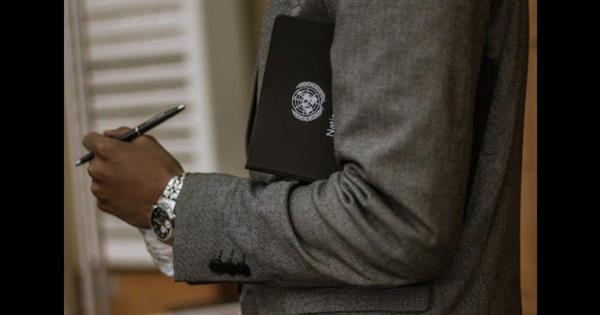
Tips of MUN procedure in India
In most Model United Nations conferences, rules of procedure are implemented to maintain order and decorum, determining who can speak, on what topics, and when. This is crucial as delegates express their viewpoints and engage with other countries on extensive agendas.
Many MUN procedure have adopted their own parliamentary rules of procedure. To bridge this gap and align Model UN procedure more closely with the actual functioning of the UN, we aim to highlight the procedural differences between MUNs and the UN and provide clear guidelines that better align with UN proceedings.
MUN procedure
An international conference serves as a platform for interaction between States, with delegates acting as representatives of their respective countries. It is through these conversations, which are primarily cooperative in nature, that much of the UN's business progresses. The rules of procedure categorize these "consultations" into two types of discussions-
Formal Consultation
During formal proceedings, the rules of procedure are adhered to under the guidance of the committee Chairperson. Delegates can deliver speeches, respond to questions, introduce and debate resolutions and amendments. The aim of these rules is to ensure that only one delegate speaks at a time. This helps in allowing the Chairperson to guide the negotiations in a constructive manner.
Informal Consultation
Delegates engage in consultations with one another from the moment they arrive at the MUN or UN conference until they depart. In addition to the official order of business, these exchanges may involve social interactions or pursuing other objectives. Such consultations take the form of face-to-face conversations where no formal rules of procedure are enforced.
You can follow some of the tips here-
1. Become familiar with the conference's rules of procedure by reading and comprehending the MUN procedure or rules of process. Make sure you are familiar with any special regulations that may apply to each MUN conference.
2. Do extensive study on the nation or delegates that you will be representing at the MUN conference. Recognize their viewpoints on the subjects being discussed as well as their foreign policy stances.
3. Write thorough position papers outlining your nation's viewpoint on the agenda items. These essays should discuss the problems and provide solutions from the perspective of your nation.
4. Have courteous and diplomatic conversations with other delegates. During committee meetings, have respectful and diplomatic conversations with other delegates. Pay close attention, make helpful contributions, and show respect for opposing viewpoints.
5. Take part in both moderated and unmoderated caucuses, offer speeches, and make informational points. Contribute thoughts, put up resolutions, and work with other delegates to get to an agreement.
6. Respect the chair's or moderator's stated speaking order. When it's your moment to address the committee, raise your placard or ask for acknowledgment.
7. Form coalitions with other delegates who have comparable goals or interests. Work together to create resolutions, get support for your proposals, and reach an agreement via negotiation.
8. Adhere to proper etiquette and diplomatic language to ensure respectability. When speaking before the committee, use official language. Even when you disagree with your fellow delegates, always act professionally and with respect.
9. Recognize the methods of voting described in the rules of procedure. Vote responsibly and show respect for the majority's judgment.
10.Put yourself in the shoes of the delegates or allocated nation. Even if they conflict with your personal beliefs, behave in a way that is consistent with the values and political stances of your nation.
By understanding and adhering to the appropriate rules of procedure, delegates can effectively navigate the formal proceedings and engage in fruitful discussions. Simultaneously, informal consultations provide an opportunity for delegates to interact outside the formal structure, fostering relationships and pursuing additional objectives beyond the official agenda.
As a delegate, it is crucial to recognize the nuances between formal and informal consultations during Model UN conferences. Understanding these differences provide you with a clearer understanding of the procedures that closely resemble the realities of UN proceedings. This recognition allows you to actively participate in Model United Nation conferences with confidence, knowing that we are navigating the simulations in a manner that reflects the authentic UN experience.
Related Blogs
-
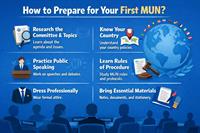
19-Jan-2026 How to Prepare for Your First MUN?
-
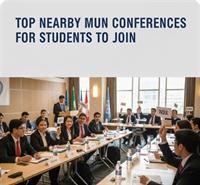
24-Dec-2025 Top Nearby MUN Conferences for Students to Join
-
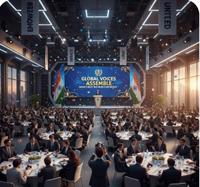
27-Nov-2025 Global Voices Assemble India Next Big MUN Conference
-
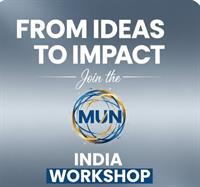
13-Nov-2025 From Ideas to Impact Join the MUN India Workshop
-
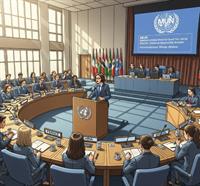
14-Aug-2025 What Is A Conference In MUN?
-
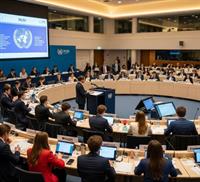
07-Aug-2025 What Does the MUN Do?
-
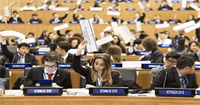
03-Jul-2025 Ways to Research for a Model UN Position Paper
-
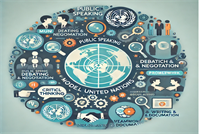
28-Mar-2025 What skills do you gain from Model United Nations?
